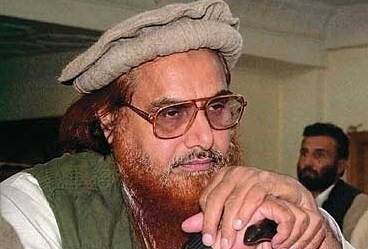
Hafiz Mohammad Saeed – India’s Most Wanted Man Free Again in Pakistan
Hafiz Mohammad Saeed – India’s Most Wanted Man Free Again in Pakistan
The release of Hafiz Mohammad Saeed, founder of proscribed Lashkar-e-Taiba (LeT) and Amir of Jama’at-ud-Da’wa (JuD), from detention last month in Pakistan has raised eyebrows in the West as well as India. He was released from house arrest on June 2 when the Lahore High Court ruled it did not have enough evidence against him on terrorism charges. However, Pakistan’s Deputy Attorney General Shah Khawar says that Pakistan’s law enforcement and intelligence agencies have enough evidence to suggest that a freed Hafiz Saeed is a continuing security threat. The Punjab provincial government and the federal government of Pakistan have already filed petitions before the Pakistani Supreme Court seeking a reversal of the decision of Lahore High Court. Nevertheless, the federal government continues to struggle to make an adequate case for his preventive detention and the Punjab provincial government has admitted its evidence is insufficient (The News [Islamabad], July 17; Daily Times [Lahore], July 17).
Hafiz was detained by Pakistani security officials last December when India accused him of involvement in plotting the bloody assault on India’s main city of Mumbai in November 2008, followed by a UN Security Council resolution that added Hafiz Saeed and his charity organization to a list of individuals and organizations tied to the Taliban and al-Qaeda. After his release from six months in detention, he strongly denied links with al-Qaeda and other terrorist organizations and condemned Pakistan’s military offensive in Swat against Taliban. India has shown its strong resentment over the release of Hafiz Saeed and his aide, senior JuD leader Colonel (ret’d) Nafiz Ahmed, while the United States has called on Pakistan to cooperate and bring the perpetrators of the Mumbai attacks to justice. Some U.S. officials have pointed out that the release of Hafiz Saeed indicates a lack of commitment from Pakistan in the fight against extremism. (The News, June 4).
Hafiz Mohammad Saeed was born to a religious family in Sargodha (Punjab province) in the tumultuous years that followed the creation of Pakistan. More than 30 members of his family were murdered in 1947 when his family migrated from Shimla (India) to Punjab (Pakistan) during the partition of India and Pakistan. His father Kamaluddin, a small landlord, gave him both a religious and modern education. Hafiz Saeed is married to Maimoona, the daughter of Hafiz Mohammad Abdullah, his maternal uncle and a famous religious leader in Punjab (Hindustan Times, June 2).
Hafiz Mohammad Saeed first drew attention when the then-president of Pakistan, General Mohammad Zia-ul-Haq, appointed him as research officer in the Council on Islamic Ideology. Then he joined the University of Engineering and Technology as a teacher of Islamic Studies in Lahore. The government then sent him to Saudi Arabia in the early 1980s for higher studies. It was there that he met some Arab jihadi leaders who inspired him to focus his energies on waging jihad in Afghanistan against the Soviet Union.
Hafiz Mohammad Saeed also met with Shaykh Abdullah Yusuf Azzam, an influential Palestinian jihad ideologue and mentor of Osama bin Laden. Azzam influenced him to found the Markaz Dawa-wa’l-Irshad (Center for Call and Guidance) in Muridke, Lahore in 1987. The institution preached jihad and the Wahhabi- Salafi form of Islam. Hafiz Saeed founded LeT in the early 1990s, allegedly with support from Inter-Services Intelligence (ISI), Pakistan’s military intelligence agency. LeT then shifted the focus of its jihad from Afghanistan to Indian-administered Kashmir (The Hindu, June 3).
LeT is believed to have been involved in almost all major attacks against India over the disputed territory of Kashmir. Hafiz Saeed stepped down from the leadership of LeT soon after India blamed this group for the terrorist attack on its parliament in December 2001. He handed over leadership of the group to Maulana Abdul Wahid Kashmiri, who is based in Srinagar, part of Indian-administered Kashmir. Shortly after this, Pakistan banned LeT after the United States added it to its list of designated terrorist organizations.
However, Saeed was quick to revive his old Markaz Dawa-wa’l-Irshad organization with a slight modification of its name to Jama’at-ul-Da’wa, beginning as a charity and public welfare organization. It is common practice for militant organizations in Pakistan to rename themselves so as to bypass the law and avoid official bans. The old offices of LeT simply changed the names on their signboards with no significant change to the nature of the activities carried out inside. However, after 9/11, due to changes in Pakistan’s policies towards India and pressure from the United States, Hafiz Saeed and his organization stepped back from aggressive jihadi activities in Kashmir. Despite this, several offices of LeT continued to recruit militants for jihad in Pakistan-administered Kashmir (BBC News, June 2).
India has long asked for the extradition of Hafiz Saeed, whom it suspects of being the mastermind behind all major terrorist attacks inside India. However, Pakistan’s government wants him to be tried inside Pakistan. So far, Pakistan has not brought sufficient evidence to punish him for his involvement in terrorist activities (Daily Times, June 5). Since 2001, he has been detained three times, but in every instance he was freed due to the apparent lack of evidence against him. In July 2006, India asked the Government of Pakistan to ban the JuD and arrest its leaders, including Hafiz Saeed, for their alleged involvement in the July 11 Mumbai train bombings that killed over 200 people. Pakistan rejected the Indian claims and put Hafiz Saeed under house arrest. He was released a month later (Hindustan Times, June 2).
The latest release of Hafiz Mohammad Saeed by court order might once again ignite the already tense relations between Pakistan and India if the ruling is not reversed by the Supreme Court.


